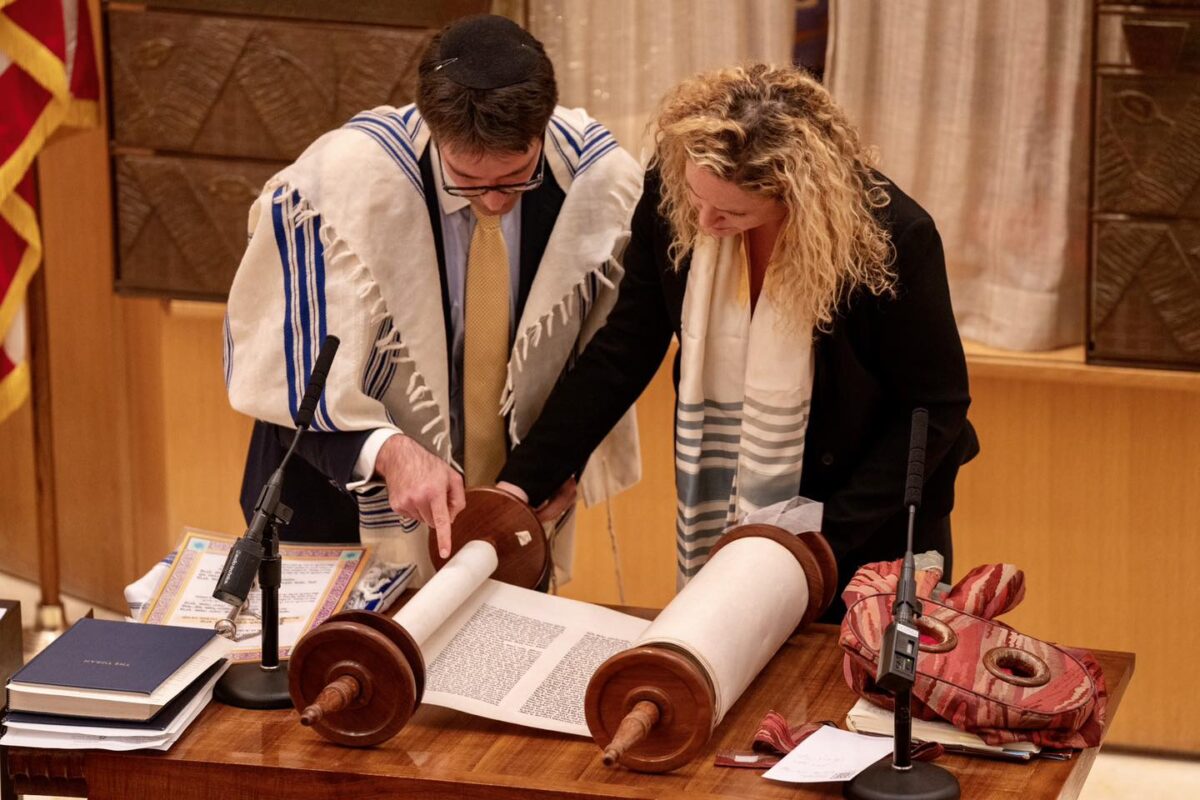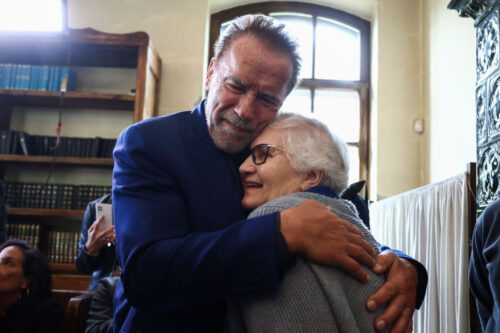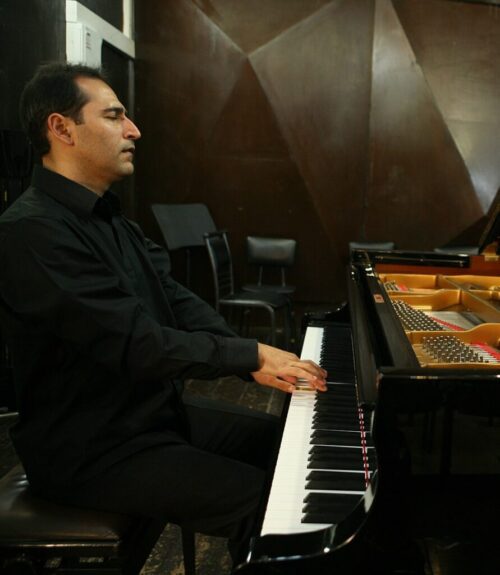Your Daily Phil: Bicycling in Jerusalem + Jewish migration in the U.S.
Good Thursday morning!
In today’s Your Daily Phil, we cover the growth of cycling in Israel’s capital, and feature op-eds by former New Orleans federation exec Michael Weil on Jewish migration, and by the leadership of NYC’s East End Temple on voluntary synagogue dues. Also in this newsletter: Bill Gates, Melinda French Gates, MacKenzie Scott, Warren Buffett, Lynn Schusterman, George Soros, Amos Hostetter Jr. and former California Gov. Arnold Schwarzenegger. We’ll start with a report from yesterday’s White House conference on hunger.
For the first time in more than 50 years, the White House hosted a conference on ending hunger yesterday, emphasizing the role of philanthropy in reaching that goal.
Part of President Joe Biden’s plan to end hunger by 2030, unveiled ahead of the conference, relies on $4 billion in philanthropic commitments — from providing free meals to efforts to make healthy food more accessible. Biden also called for a permanent expansion of the child tax credit along the lines of last year’s pandemic relief bill, a measure that led to a steep reduction in child poverty.
“Since that time, advances in research and medicine have taught us so much more about nutrition and health,” Biden said in reference to the last White House conference on hunger, which was held by President Richard Nixon in 1969. “I’m convening this conference again because I believe we can do even more to make America a stronger and healthier nation.”
Attendees included elected officials, business leaders and nonprofit executives, including leaders of Jewish groups that focus on hunger and poverty. David Greenfield, CEO of the Metropolitan Council on Jewish Poverty, told eJewishPhilanthropy that leading up to the gathering, his organization consulted with Rep. Jim McGovern (D-MA), co-chair of the House Hunger Caucus, on setting the conference agenda. Greenfield called Biden’s 2030 goal “very attainable.”
“The only reason we have hunger in America is because we don’t have the political courage to solve it,” he told eJP. “The fact that there’s now a clear demonstrated interest from the White House to solve hunger in the next eight years is tremendous.”
One priority of the Met Council’s that was discussed in the conference is to make more kosher and halal food available through TEFAP, a federal program that provides food to low-income Americans. Currently, Greenfield said, only eight of 126 products available through the program are kosher- or halal-certified.
“If folks don’t have access to culturally and religiously appropriate food, they’re not going to be eating that food,” he said. “Some of the most popular products that they give out for free are things like pork.”
Also present at the conference were representatives of Mazon: a Jewish Response to Hunger, which hosted an interfaith reception Tuesday night together with the Christian group Bread for the World and Islamic Relief, which both combat hunger.
This summer, Mazon composed a position paper whose priorities included calling for increased access to food and accuracy in data about nutrition programs. The Jewish Federations of North America submitted a similar document to the White House that called for expanding federal food assistance programs.
“The notion of ending hunger is really about [having] many more people coming off of benefits… than those who find themselves in need,” Mazon CEO Abby Leibman told eJP. “That vision seemed universally accepted at this conference but, of course, the devil is always in the details… ?The question gets asked at the conference, then that hard work becomes, how do we answer the question?”
WHEEL CHANGE
Jerusalem’s cycling activists face an uphill climb


EITAN BENO/BICYCLES FOR JERUSALEM
For secular Israelis, next week offers the opportunity for the best biking holiday of the year: Yom Kippur, when cars in Israel stay off the road and bicycles fill empty highways. But a group of activists is promoting cycling year-round in Jerusalem, where most Jews don’t bike on the Day of Atonement and the hilly terrain makes for tough pedaling. After years of advocacy, they’re finally finding success, reports Melanie Lidman for eJewishPhilanthropy.
Pandemic push: For years, the group, called Bicycles for Jerusalem, has been beating on the door of City Hall, begging for meetings with the city’s planners and trying to encourage more biking in the city. After public transit use decreased during the COVID-19 pandemic, the capital slowly started incorporating more bicycle infrastructure. The change comes as the city is undergoing a massive facelift, with several large infrastructure projects, including an expansion of the light rail.
Growing paths: Before 2020, there were 30 miles of bike paths in Jerusalem, according to City Hall. But since then, the city has added 11 miles of paths, an increase of 34%. The Jerusalem Transportation Master Plan has called for 125 miles of bike paths across the city’s 48 square miles. That still pales in comparison to Tel Aviv, which has 155 miles of bike paths in a city half the size.
Tunnel vision: The city is also actively promoting bike infrastructure, both for daily use and for fun. On Sept. 9, the city opened a new bicycle-only tunnel through the hills near the western neighborhood of Ein Kerem — part of a 26-mile cycling path around the outskirts of the city. The tunnel was originally built in the 1990s to transport wastewater, and was opened only once a year to bikers for a special ride around Jerusalem. After $7 million of improvements, the tunnel is now open to bikers every day of the year. At 1.3 miles, it is the fifth-longest cycling tunnel in the world.
SHIFTING POPULATION
Jews on the move: The geographic dimension of Jewish survival in North America


iStock
“Throughout history, Jews have been a people on the move, from the nomadic Abraham and Sarah to Moses wandering in the desert, to the massive relocations of the modern era often spurred by antisemitic violence and poverty. This last contributed significantly to the creation of the two Jewish population mega-centers that exist today: Israel, an intentionally created Jewish state, and the United States, where Jews constitute an accepted and respected minority,” writes Michael Weil, former executive director of the Jewish Federation of Greater New Orleans, in an opinion piece for eJewishPhilanthropy.
U.S. inter-regional migration on the rise: “As roughly 90% of all Jews now reside in these two centers, it can be argued that in the 21st century the Jewish people at last achieved a level of demographic stability, that the ‘wandering Jews’ now wander no more. Yet, a closer look at the demographic trends in one of these centers, the U.S., reveals that within this population concentration, Jewish inter-regional migration rates are on the increase.”
The need for national intervention: “This level of geographic change poses critical challenges to Jewish continuity, particularly as preliminary research suggests that migration frequently results in reduced Jewish engagement and affiliation. National, strategic intervention, supplemented by detailed local initiatives, could help communities respond effectively to the demographic changes at play in their areas. But for such a plan to be developed and implemented, data on the extent and character of the moving populations needs to be gathered and analyzed.”
SYNAGOGUE LIFE
Voluntary dues afford us a better Jewish new year


Courtesy of Hannah Stampleman / East End Temple
“Since their founding in our country more than three centuries ago, synagogues have served as the mainstays of Jewish life, welcoming and helping generations of Jewish immigrants acculturate and articulate uniquely Jewish and American identities. But for far too long, many Jewish congregations have utilized a model of set dues that members need to pay for access. While most congregations express a value of welcome, set dues can create a financial barrier and shift the focus away from deep communal relationship,” write Brian Lifsec, Rebecca Shore and Rabbi Joshua Stanton, of New York City’s East End Temple, in an opinion piece for eJewishPhilanthropy.
Community commitment: “It’s time to invert the model – giving much and empowering and welcoming even more. Our community just became the first Reform congregation in Manhattan to align its fundraising with its values. We now empower our members to give to their hearts’ content, but without a formal mandate or fixed level. Our voluntary dues (‘community commitment’) membership is poised to transform not only our presence externally, but how we relate internally.”
Post-pandemic: “East End Temple is blessed to be among the few synagogues – and even fewer in major urban areas – to emerge larger and more vibrant than we were in March 2020. What became evident during our time physically apart – or in varying stages of hybrid togetherness – was that lay-led programs engaged the most people in the most soulful ways.”
Bottom up: “With so much shifting to lay leadership, in intentional collaboration with our clergy, it no longer made sense to use a top-down funding approach of fixed dues. We have trusted our community members with key functions as never before. We can trust them to care for our community financially as well.”
Worthy Reads
Digital Development: TikTok, the video medium so popular with teens, is also a vital tool for today’s nonprofits in reaching new audiences and building visibility for organizations, Stephanie Minor writes in NonProfitPRO: “Marketing to Gen Z and Millennials, particularly through platforms like TikTok, taps into a group of passionate, digitally oriented activists and advocates. For example, nonprofits like Diversability, focused on people living with disabilities, are finding great success reaching this demographic through TikTok by providing videos created by and for people with different abilities. These are just a few ways for nonprofits to get started. TikTok is unlikely to go away anytime soon and is a worthwhile investment of time for nonprofits. More and more nonprofit social media teams that are managing Facebook, Instagram, and Twitter, are integrating TikTok into the growing list to help their organizations expand their audience, build awareness, raise money and thrive.” [NonProfitPRO]
Transparency Talk: Foundations urge transparency for grantees, as well as in business and government, Clara Miller writes in The Chronicle of Philanthropy, but aren’t always transparent themselves: “Most grant makers, however, fail to live up to their professed transparency standards. They strictly control data and narratives about their own performance in areas such as investment, staff, strategy, and allocation of funds. They generally do little more than the bare minimum required by the IRS and state charity regulators, which means making their latest tax returns, and sometimes their audited financial statements, available… At a time when the internet and social media have made vast supplies of information (and misinformation) readily available, there is no excuse for philanthropy to continue constructing walls around its own operations. Foundations can gain in stature and credibility by revealing themselves to the world as public companies do. And large grant makers have a special responsibility to lead the way. When foundations crack open their protective, closed world — even just a little — the fresh air will do them and the whole field a world of good.” [ChronicleofPhilanthropy]
Community Comms
Be featured: Email us to inform the eJP readership of your upcoming event, job opening, or other communication.
Word on the Street
Nine individuals or couples have given away at least 20% of their net worth: Giving Pledge signers Bill Gates, Melinda French Gates, MacKenzie Scott, Warren Buffett, Gordon and Betty Moore, Lynn Schusterman, Amos Hostetter Jr.and John and Laura Arnold, as well as George Soros, who topped the list as America’s biggest donor as measured by a percentage of net worth for the third year in a row.…
Israel’s cabinet is expected to approve on Sunday more than $25 million for absorbing Russians entitled to immigrate to Israel under the Law of Return. Following the mobilization of reserve troops announced by Russia last week for its invasion of Ukraine, Israel anticipates an increase in immigration from Russia, with an estimated 14,000 Jews expected to arrive over the coming three months…
MacKenzie Scott has filed for divorce from her husband Dan Jewett. The couple had publicly pledged to give away billions of dollars, and both Scott and Jewett had signed the Giving Pledge…
The New York-based Simons Foundation is providing Atlanta’s Spelman College $5.7 million to support half the salaries of 10 new science, technology, engineering and math faculty members through August 2028, letting the professors spend half their time conducting research and providing research opportunities to students…
The Ford Foundation donated $1.5 million for emergency recovery efforts in Puerto Rico following flooding from Hurricane Fiona…
The U.S. government will soon make its eighth payout from the Madoff Victim Fund, which will bring total payouts of about $4.08 billion in one or more payments to 40,454 individuals, schools, charities, pension plans and others that were defrauded by disgraced financier Bernie Madoff…
Pic of the Day


Photo by Beata Zawrzel/NurPhoto via Getty Images
Former California Gov. Arnold Schwarzenegger ?hugs Lidia Maksymowicz, a Holocaust survivor, during a visit yesterday inside a former synagogue that is now home to the Auschwitz Jewish Center Foundation. Schwarzenegger also visited the former Auschwitz-Birkenau concentration and extermination camp in Oswiecim, Poland.
Birthdays


Courtesy
Composer and pianist, he is the winner of the 2020 Azrieli Foundation Prize for Jewish Music, Yitzhak Yedid…
Professor of physics emeritus at MIT, he is a 2017 Nobel Prize laureate in physics, Rainer Weiss… Israeli author, translator, journalist and restaurant critic, Avital Inbar… Retired CEO of Southern Calif.-based LinQuest Corporation, he is the finance VP at Temple Sinai, Leon Biederman…. Former member of the Knesset, he serves as the executive director of Beit El Yeshiva and as chairman of Arutz Sheva, Ya’akov Dov “Katzele” Katz… Past treasurer of the board of trustees of the Jewish Federations of North America, Harold Gernsbacher… Tony Award-winning actor and singer, Roger Bart… Chief strategy director for national affairs at AIPAC, Brian Shankman… Director of the Smithsonian Institution’s office of international relations, Aviva Rosenthal… YouTube-based yoga instructor with over 1.2 billion views, Adriene Mishler… Project manager at New York City’s Neighborhood Restore, Aron Chilewich… Research director at D.C.-based S-3 Group, Shawn Pasternak… Film and television actress best known for her role in the ABC comedy “The Neighbors,” Clara Mamet…
Email Editor@eJewishPhilanthropy.com to have your birthday included.








